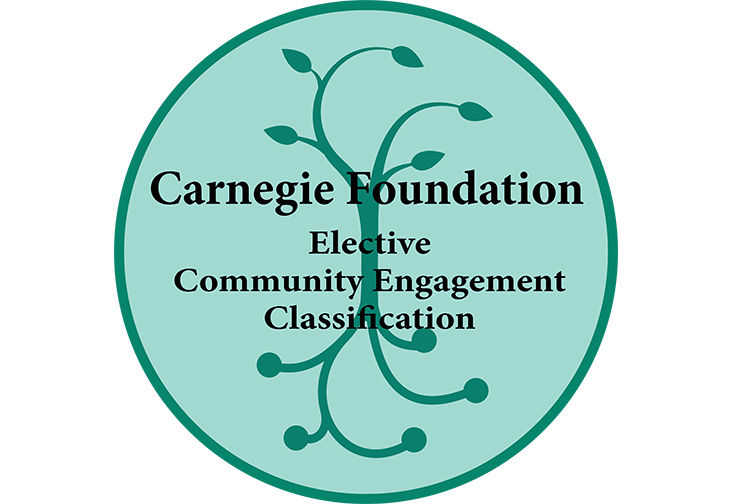USF St. Petersburg has been selected for the Carnegie Community Engagement Classification, a prestigious designation that recognizes institutional commitment to community and civic engagement.
USF St. Petersburg joins 118 other U.S. colleges and universities, including USF in Tampa, in earning the classification during the 2020 cycle. The designation follows an intensive process of self-study by each institution, which is then assessed by a national review committee led by the Swearer Center for Public Engagement at Brown University, the administrative and research home for the Carnegie Community Engagement Classification.
USF St. Petersburg Regional Chancellor Martin Tadlock said the designation highlights the university’s ongoing commitment to promoting civic engagement and community partnerships in Tampa Bay and beyond.
“We are dedicated to preparing students to become thoughtful, engaged citizens and advancing research and knowledge that serves the public interest,” said Tadlock. “The Carnegie classification speaks to that core mission and is embedded in the fabric of what it means to be a part of the USF St. Petersburg community.”
This is the second time USF St. Petersburg has received the Carnegie Community Engagement Classification. It was first classified in 2010.
Judithanne Scourfield McLauchlan, an associate professor of political science and the founding director of the Center for Civic Engagement at USF St. Petersburg, led the year-long effort to earn re-certification. She noted that the 2020 application required far more detail than was the case 10 years ago.
“The Carnegie Foundation made it very clear how much more rigorous the standards are this time around,” said McLauchlan. “They basically said that just because you had the designation before, don’t think this will be a walk in the park. It’s striking how many universities that had the community-engaged classification in 2010 chose not to pursue reclassification. The Carnegie Foundation’s expectations were very daunting.”
Of 121 institutions nationally that could apply for the re-classification, 44 did not.
“We needed to demonstrate that we have meaningful, sustained partnerships,” said McLauchlan. “This provided a special challenge but also an opportunity for soul-searching: What makes St. Petersburg special, what is our identity? Time and time again, what we found is that we’re part of the community, that we have a passion for our citizen-scholar program.”
She said the classification is a natural fit for USF St. Petersburg, which has a continued focus on expanding students’ hands-on learning opportunities through job shadowing, volunteerism, internships, study abroad and other activities.
For example, for the past 12 years, accounting students from the Kate Tiedemann College of Business have helped individuals and families navigate the complexities of filing taxes while boosting their skills through the IRS VITA program. Short for Volunteer Income Tax Assistance, VITA provides students with relevant training in tax preparation services. In return, the USFSP students provide free income tax preparation and assistance to low- and middle-income families in Pinellas County, generating around $1 million in tax credit refunds each year.
Journalism students from the Neighborhood News Bureau (NNB), a working newsroom covering the historic African American neighborhoods of south St. Petersburg, recently launched the NNB Black History project, which chronicles the storied past of St. Petersburg’s African-American communities. Through multimedia, oral histories, digital story mapping and a searchable database, the students created a comprehensive resource to document a vital chapter in the city’s history.
The campus also has partnered with Community Action Stops Abuse (CASA) since 2006. During the 2016-17 academic year, a student-led initiative raised more than $29,000 from 170 students who donated unused meal plan funds to buy food to donate to the organization. CASA said it was the single largest food donation in its 40-year history.
“Being in the community enhances the students’ learning,” added McLauchlan, who is leading a group of 29 political science students on a trip to New Hampshire to participate in the presidential primary campaigns. “They understand the content better when they have hands-on experience in addition to reading and talking in the classroom.”
